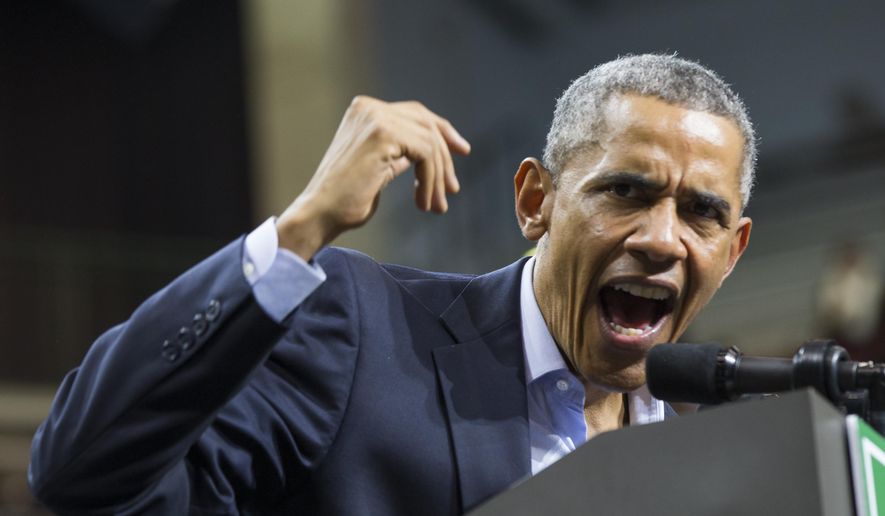The White House Tuesday defended President Obama’s increasingly invisible campaign work for congressional Democrats in the midterm elections and suggested that candidates who are shunning him will be to blame if Democrats lose control of the Senate.
With Mr. Obama relegated to raising money behind closed doors and appealing to black voters on radio programs, the president’s spokesman said congressional candidates shouldn’t lose sight of Mr. Obama’s “unprecedented ability to earn the support of and turn out” blacks at the polls.
“The success of many of these Democratic candidates will depend on their own success in motivating voters that strongly supported the president in 2012,” said White House press secretary Josh Earnest. “Ultimately, those Democratic candidates will have to develop their own strategies in their states for figuring out how exactly to do that.”
The unpopular president has been sidelined on the campaign trail this fall, with congressional candidates avoiding joint appearances with Mr. Obama in key Senate races such as Alaska, Arkansas, Colorado, Louisiana and North Carolina. The president’s only campaign rallies to date have been with the Democratic gubernatorial candidates in Illinois, his home state, and in Maryland.
Mr. Obama told radio show host Al Sharpton that he knows Democratic candidates support his agenda, even if they don’t want to be seen with him.
“This isn’t about my feelings being hurt,” Mr. Obama said on Monday. “These are folks who are strong allies and supporters of me, and I tell them, ’you know what, you do what you need to do to win. I will be responsible for making sure that our voters turn out.’ The bottom line is, though, these are all folks who vote with me; they have supported my agenda in Congress.”
And each time Mr. Obama insists his agenda is on the ballot, Republican campaign operations gleefully remind voters of his comments. It’s creating a situation where Mr. Obama is limited to speaking to a relatively narrow section of the Democratic base, only in reliably “blue” states.
“He is going where they will welcome him and where he thinks he can help out in some way,” said former Rep. Connie Morella of Maryland, a Republican who now teaches at American University. “He’s losing any of the lustrous aura that he originally had.”
As Democratic candidates across the country try to distance themselves from Mr. Obama, the president can take comfort in the fact that he would be welcome in states such as bluer-than-blue Oregon.
“Certainly, anytime the president would like to come to Oregon, I’d love to show him around and talk to the issues we have here,” Sen. Jeff Merkley, Oregon Democrat, said Tuesday on MSNBC. “It would be fine for him to come here. But there [are] far closer races in other parts of the country. I want the president to make the best use of his time.”
Mr. Merkley leads Republican challenger Monica Wehby by 13.5 points in the RealClearPolitics latest average of public polling on his own race.
Asked why Democrats have had a hard time coming up with a message resonating with voters, Mr. Merkley cited “national scare tactics” employed by Republicans in recent weeks involving the Islamic State terrorist group and Ebola.
He said Democrats have been focused on a “fair shot” agenda with items like efforts to repatriate overseas jobs and make college affordable that have been blocked by Republicans.
“If we’re focused on the fair shot for all Americans, I think it would be very clear that the Democrats would be winning hands down,” he said.
But other than doing radio interviews, Mr. Obama has been in the background, raising money tirelessly for Democrats with big-money donors in locations such as New York, Chicago, Los Angeles and San Francisco. Aides say the White House is also offering Democratic candidates organizational advice and expertise from Mr. Obama’s get-out-the-vote re-election operation in 2012.
Mr. Earnest said the president still believes Democrats will win enough seats to hold onto the Senate — the GOP needs to pick up six seats — and that Mr. Obama isn’t interested in doling out blame for a potential loss. He said individual candidates “will get all of the credit or blame that they deserve for the outcome of the election.
“I’m also confident that people will evaluate what the president could do to be helpful,” Mr. Earnest said. “What the president is focused on is doing everything that he can to support Democratic candidates across the country.”
• David Sherfinski contributed to this report.
• Dave Boyer can be reached at dboyer@washingtontimes.com.




Please read our comment policy before commenting.